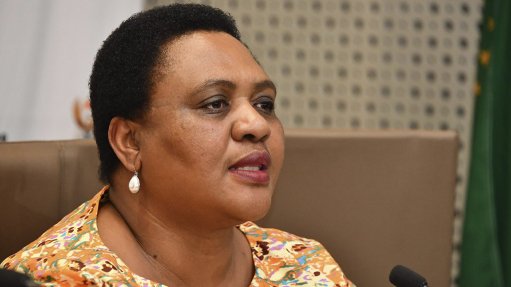
Agriculture, Land Reform and Rural Development Minister Thoko Didiza
The Department of Agriculture, Land Reform and Rural Development (DALRRD) has, together with the Land Bank, launched a blended financing instrument to aid farmers in accessing alternative energy solutions amid the electricity supply crisis.
While State-owned energy utility Eskom has been providing load curtailment agreements to stakeholders in the agriculture industry, government deemed it prudent to help minimise interrupted production from loadshedding further, particularly for large energy users.
In response, Agriculture, Land Reform and Rural Development Minister Thoko Didiza on August 29 launched the Agro Energy Fund (AEF).
She pointed out that the AEF had been allocated R500-million from DALRRD’s budget for the current financial year, while the Land Bank had set aside R750-million, taking the total fund to R1.2-billion.
The AEF will assist smallholder farmers and large commercial producers access alternative energy solutions for energy-intensive agricultural activities such as irrigation, intensive production systems and on-farm cold chain-related activities.
Priority will be given to on-farm producers excluding off-farm processors.
The Land Bank will provide loans for up to 70% relative to the grant portion of an alternative energy solution such as solar, biogas, anaerobic digesters and biomass for smallholder farmers, capped at R500 000, with medium-scale producers receiving up to 50% in terms of the grant-to-loan ratio, capped at R1-million.
Large-scale producers will receive up to 30% in loans relative to the grant portion, capped at R1.5-million.
Didiza acknowledged that the amounts may not be enough, but said it was a good starting point in mitigating the challenges that farmers and agribusinesses are facing and to help ensure food security.
The blended AEF facility is intended for use to buy capital equipment and infrastructure for alternative power generation.
Land Bank deputy chairperson Andrew Makenete noted that the Land Bank had been experiencing significant liquidity challenges since 2020, which had limited its ability to effectively function and serve farmers in the country. However, the bank has been on a journey of recovery, with a new and holistic approach to its functioning.
“For Land Bank to effectively serve the sector, it is key to have an effective funding regime. This will ensure the bank can sustainably manage itself. We have already created an enabling environment for the bank to participate in the agriculture sector,” said Makenete, adding that full stabilisation of the bank was still a work in progress.
He is confident that the AEF will help mitigate any negative impacts on food security and that more than 500 primary producers can be supported.
To access the funding, Land Bank CEO Themba Rikhotso explained that applying entities and individuals needed to be South African citizens, or registered in South Africa, and operate agricultural activities at the primary or secondary level.
Notably, only applicants that prove viable to repay the loans will be approved.
The loan criteria, therefore, include financial statements for the last financial year, a business plan to support the loan application, proof of land ownership or proof of access to the land and cash flow projections for the next 24 months.
The Land Bank will also need to see an expert report determining the energy requirement of the producer and showing the historical energy use of the producer – to this end, a three-month municipal electricity statement is acceptable.
Rikhotso said the bank may also require environmental authorisation, where applicable.
The loans will typically be provided over a medium term, up to ten years.
Rikhotso emphasised the importance of producers using approved and registered service providers for the installation of the solution. Land Bank is, in this regard, establishing a panel of service providers from a pool of its strategic partners.
The Land Bank said it would help producers “shop around” for the best alternative energy solutions.
Depending on the complexity of each producer’s situation, Land Bank anticipates a turnaround time for applications of between two and six months.
“We hope that farmers will take advantage of this fund, which will alleviate the impact of loadshedding on agricultural operations.”
AGRISA COMMENTS
Industry body Agri SA has welcomed the launch of the AEF.
"Given the cost pressures facing farmers, notably as a result of loadshedding, the fund will provide vital support to the farmers who safeguard South Africa’s food security.
"This vital funding is essential to help maintain the financial viability of the sector, thus also protecting the livelihoods the sector sustains. While the funding will not address the magnitude of the challenges facing South Africa’s farmers or the extent of the impact of the energy crisis on their enterprises, it is a strong indicator of the department's commitment to protecting the nation’s food security," it said.